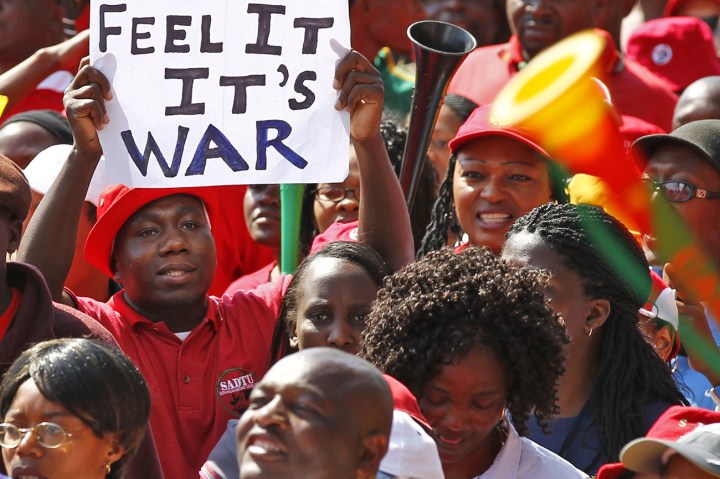Politics
Analysis: Lest we forget, ‘Striker Continua’

The news that the public servants' strike was finally and rather quietly settled with the SA government came as little surprise and with even less fanfare. But have we, as a society, learnt anything? By STEPHEN GROOTES.
In our politics, striking could be construed as political warfare by other means. It has all the trappings of real hard conflict, the dead lying in hospitals, the walking wounded waiting outside, empty schools, the trashing of city streets, and the generals, the politicians, whose reputations are made or destroyed during these clashes. Government has finally, eventually, after a three-week “suspension” prevailed over the unions. And they have signed the deal that was on the table.
But the damage that has been wrought by the public display of government’s inability to govern is not over.
If you are poor in South Africa, it is easy to be angry. Everyone has it better than you. And there’s almost no way out of the trap that has been set for you from birth, not even within the new, democratic dispensation. So when the chance comes to hit back, at any symbol of structure, you are going to take it.
Union leaders surely know this. So when they uncork this anger, they are playing with this country’s deepest problem, the very fire of the devil itself. Countries and societies have different patchworks of rights and obligations, built up over time, that keep them together. You rip that patchwork apart, you get violence. And by allowing the violence to happen in the first place, you could start something you cannot stop.
The fact is we all know nothing is going to happen to those strikers who committed violent acts. Those people caught in a photograph walking nonchalantly past a baby incubator. If nothing illustrates the power of the unions, that picture should do it. We lost count of the number of times union leaders pleaded with their members not to be violent. Every appeal fell on deaf ears.
And if you think this is alarmist, consider this. Zwelinzima Vavi was forced to explain to the Nehawu congress exactly how certain deals were struck. He knew the members were angry at Cosatu. This is Vavi, possibly the most popular unionist we’ve seen. Forced to explain the minutiae of late-night meetings with cabinet ministers, to make sure people didn’t think he’d sold them out. And even he wasn’t strong enough to get Sadtu to come into the fold, they didn’t want to sign, but had to stop striking because of the way the bargaining system works.
This is clear evidence that the anger of our people had been uncorked. And the genie cannot just be shoved back into the bottle.
To make matters worse, union members now know that the angrier they appear in public, the more they’ll get. Really. Each time we have one of these strikes, they seem to get more difficult to control. So anger and violence can be seen as a way of getting what you think you deserve. Needless to say, this is hardly the way to create a more rational society. In fact, it’s downright dangerous.
To fix this deep problem is going to be difficult. While many people long for a “Thatcher moment” that would see government stand up to the unions, it’s going to be a strong leader indeed who’ll be prepared to take on Cosatu at the moment. Not directly at the least. What really needs to happen is someone who is able to buy them off, to love them to death, needs to emerge. In other words, someone who is able to make sure a strike doesn’t happen in the first place. That’s about high-level political calculation, ensuring that “suitable” leaders are in charge of the union movement in the first place (by “suitable” we mean either angry enough to go too far and lose the moral argument, or malleable enough to be out-foxed during negotiations), and about getting the economic conditions right (Sounds like a job for one Gwede Mantashe – Ed).
Government was running out of options towards the end of this strike. In a way, the “suspension” was really a ruse by union leaders to calm things down. Government (you can read the ANC if you like) had to basically ask them for a favour. It had no more money. It’s a sign of Cosatu’s power. But it also shows how weak government can be. Can you imagine what would have happened if someone less popular than President Jacob Zuma had been running the show? Or if the ANC’s national working committee had decided to have a disciplinary hearing into Vavi at the same time? The potential for real trouble would just grow.
The strike is now officially over, bar the grumbling. But our social patchwork has been torn. And there’s a very real possibility that the next strike will make us remember fondly how quiet, subdued and overall decent strikes of 2010 were. DM
Grootes is an EWN reporter.
Photo: Reuters.




 Become an Insider
Become an Insider